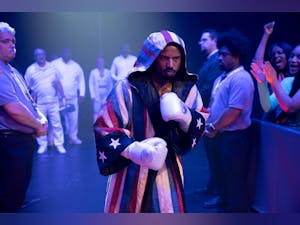From: Silver Screen
‘The American Diplomat’ tackles America’s self-representation overseas

“The American Diplomat” is the premiere film from FLOWSTATE Films, a woman-owned, full-service production company based in the D.C. area. The film explores race within the state department through the stories of three Black U.S. diplomats.
We are introduced to diplomats Edward Dudley, Terence Todman and Carl Rowan who are faced with having to represent a narrative of U.S. democracy for the rest of the world. However, complicating this mission is the ongoing Civil Rights Movement and the Cold War. Typically, American history omits foreign perspectives on this era, as the foreign press reporting the U.S.’s civil rights abuses are highly unflattering.
Nonetheless, like the diplomats who faced these American contradictions head-on, “The American Diplomat” doesn’t shy away from this candid lens either. The filmmakers include clips from other countries’ news headlines rupturing the U.S.-centrism that is so prevalent in our history courses and books. This choice elicits a confrontation between how Americans see themselves and the reality of our actions.
The film excels in its use of archival material. Throughout its runtime, photographs of the diplomats and their families are accompanied by the voices of Dudley, Todman and Rowan themselves. These images and oral histories come from the Griffith Davis collection at the Howard University archives.
One particular scene that uses these materials well is one that follows Dudley’s experience as a diplomat in Liberia. There, Dudley’s staff included a small community of fellow Black diplomats, some of whom had been in Liberia for years, often experiencing more freedom there than in the segregated United States. The scene in Liberia captured by Griff Davis, a Black photographer turned Diplomat, includes scenes of couples and families smiling, lounging in their gardens and enjoying activities such as croquet.
The film honors this storytelling with its seamless movement through history, incorporating the current events which informed these diplomats' experiences. Rowan’s experiences in Finland are particularly interesting as he was stationed there to try to win their favor in the Cold War while the Soviet Union loomed large on the border. Rowan’s presence was particularly important as race was undermining the ability of the U.S. to appeal to emerging nations.
As a Black man, he was meant to signify American progress and lend the country more credibility. The film shows how Dudley, Todman and Rowan avoided tokenization by the U.S. government and retained agency. Rowan eventually succeeded in persuading the president, Urho Kekkonen, to sign an international treaty with the U.S. by interacting with Finnish people more so than any ambassador who came before him.
The film offers a new perspective on a history that has been covered extensively by the media. For the most part, popular media about this era portrays other countries waiting to be saved by America — the force of good in the world combatting the corrosive and widely spreading communism.
This story proves to be complex, revealing the many contradictions that exist within the U.S., for example, being a country that advocates for democracy while simultaneously relegating racialized people to secondary citizen status. For Dudley, Todman and Rowan this was something that figured heavily on their minds as they navigated the complications of being a Black patriot.
“The American Diplomat” offers a new perspective on an important era of history and gives the viewer a glimpse into one of the most historically elitist, white male-dominated factions of the government. The documentary puts forth a more realistic look into this era by highlighting actors who are usually ignored. Not only does the film illuminate the great American contradiction implicit in democracy, but it also provides examples of how we can do better.
“The American Diplomat” premiered on Feb. 15 as part of PBS’ American Experience programming.




